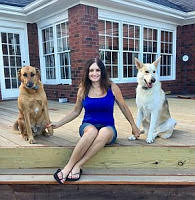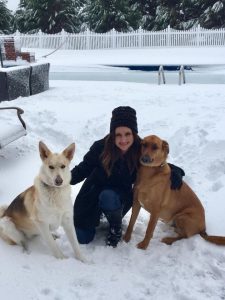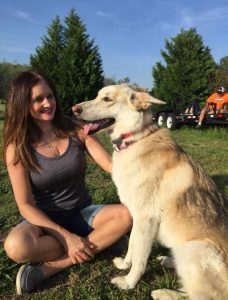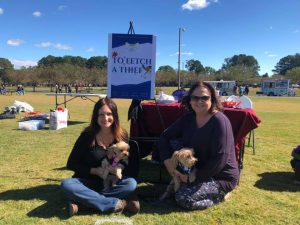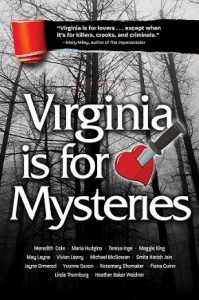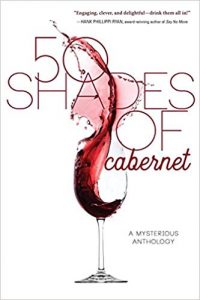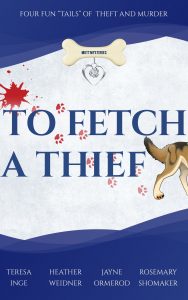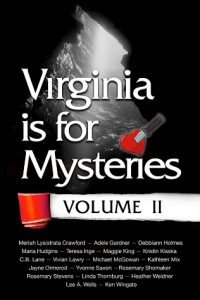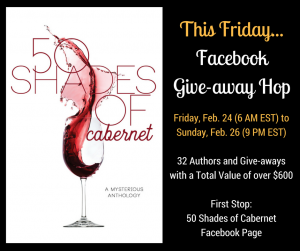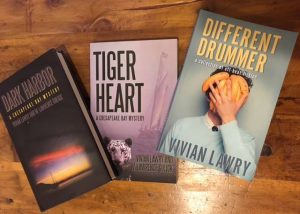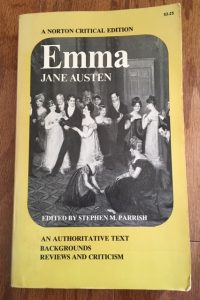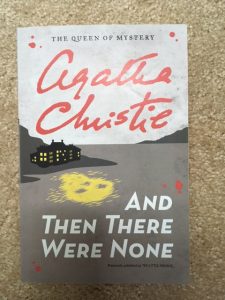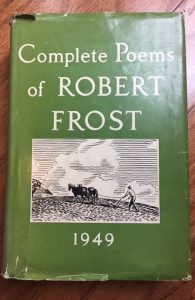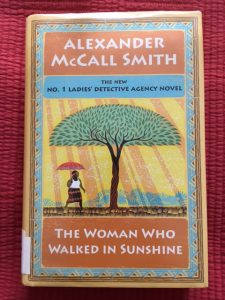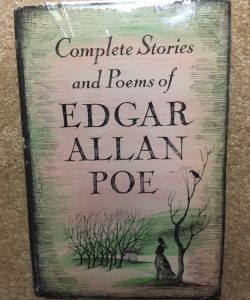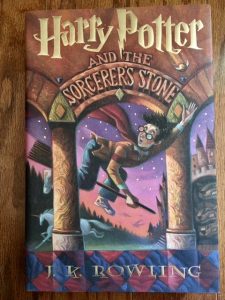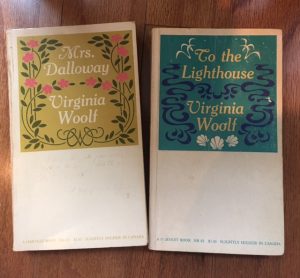by Rosemary Shomaker

VL: Thanks to Rosemary Shomaker, we have a chance to vicariously experience the struggle of a writer stretching into a new challenge. Although Rosemary doesn’t get into her story in To Fetch a Thief directly, “This is Not a Dog Park” is great. She should definitely go long again/more in the future. And as an added bonus, check out her dog!

I’ve commented to friends (and to anyone asking about my writing) that completing a novella was difficult for me, a short-story writer. As I reflect on this, the words to “Seasons of Love” from the Broadway musical Rent keep floating through my brain. Let me plant the ear-worm for you:
Five hundred twenty five thousand six hundred minutes.
Five hundred twenty five thousand moments so dear.
Five hundred twenty five thousand six hundred minutes.
How do you measure,
Measure a year?
In daylights?
In sunsets?
In midnights?
In cups of coffee?
In inches, in miles, in laughter, in strife?
In five hundred twenty five thousand six hundred minutes.
How do you measure a year in a life?
Now, let me connect the dots. Short stories have a word count of 4,000 to 8,000 words; those are the targets many publishers suggest when soliciting short story submissions. How long is that? At 250 words to a double-spaced manuscript page, you’ll find short stories weighing in at sixteen to thirty-two manuscript pages. What does that mean in a book? For a 5.5” x 8.5” book size, that translates to ten to twenty pages.
In writing a short story, you typically write twice the length and then cut, edit, and rewrite to produce a tight short story—eliminating half of what you initially wrote. I chose short story projects for several reasons. Primarily, I liked the compressed focus—of both the length and the writing period. I could assess my time and plan accordingly. Violà! I’d finish and see results within weeks or months.
For the first in the planned Mutt Mysteries series we aimed to produce a book including four novellas. “What are those?” you ask. Simplistically, a novella is a short novel or a long short story. To check what I tell you, I Googled “novella,” and found one explanation that a “novelette” runs 7,500 to 17,499 words, and a “novella” is 17,500 to 39,999 words. How precise! You guessed it—40,000 words and more is a novel. The varied fiction genres, however, have specific expectations. A mystery novel runs 80,000 to 90,000 words, for instance. The To Fetch a Thief novellas run about fifty pages each.
I wrote my first draft of “This is Not a Dog Park.” My word count was 8,300 words—and that was only the first draft! Remember my comment about expecting to cut half of a first draft? I was sunk. Clearly, this novella task was a different animal than a short story. Yes, but I didn’t realize the different animal was a beast! I floundered for several weeks, trying to “gin up” my plot and visualize the long mile to 17,500 words. (“Gin up”? Who says that? I looked up the idiom—see * below for the very interesting origin—I love words—but I digress!)
My first attempts at adding volume to the story were horrible. I found myself cranking up meaningless descriptions. I added useless comments. Each time I did this, my short story writing training rebelled at the waste and at the imprecision of the prose.
It took me adjusting to a completely different mindset to make any useful progress. The place to start for me was the plot. In a novella, I could have more happening than I could in a short story, and I explored that. In addition, my characters could interact more and build their relationships over several scenes. I gave myself permission to relax the compactness of short story boundaries. Still, my product was unfocused. It’s only when I deleted some useless scenes and repurposed others that I felt progress.
Back to the song. Here’s how the words translated to my novella ordeal:
Seventeen thousand—then add five hundred words.
Up to thirty-nine thousand nine hundred ninety-nine.
More than seventeen thousand five hundred words.
How do you measure,
Measure a plot?
In action?
In hours?
In scenes or in lines?
In pages, in edits, in words by the ton?
Seventeen thousand—then add five hundred words.
How do you measure when your novella is done?
The beauty of this novella-writing exercise for me was that finally the “organicness” (that’s a dodgy word—“organicity” is worse—that layers on medical meanings) of writing emerged, finally, and I received the gift of having a glimpse of the work of a true novelist. Yikes, that’s some hard work! My regard for any novelist has increased, and my awe of good novelists compounds exponentially.
In my learning experience writing this novella, I did, as “Seasons of Love” reminds us, “You got to, you got to remember the love.” I do love writing!
* “Gin up” – one Googled source yielded the explanation below. You bet I checked the definition of “feague”! That definition used the euphemism “fundament” . . . I love words!
“Gin up” means enliven, excite or enthuse. Its probable derivation is from the 1800s British slang term “ginger up,” which referred to the practice of putting ginger up a horse’s butt to make him spirited and prance with a high tail, for purposes of show or sale. The other term for this practice is the verb “feague.” This is confirmed both by the online Phrase Finder from the UK and the OED. (https://www.urbandictionary.com/define.php?term=Gin%20up)

VL: Thank you Rosemary! I appreciate your candidness and rich language. In addition, I think you are an inspiration to other writers striving to expand their writing lives. I do hope we collaborate again sometime. And to close out, just one more great photo.

Rosemary Shomaker has called Virginia home for decades. After a state government career writing inspired nonfiction, she now writes fiction. You can find a few of her short stories in anthologies such as Virginia is for Mysteries – Volumes I and II, 50 Shades of Cabernet, and several of the Shaker of Margaritas anthologies. Her “This is Not a Dog Park” novella is included in the Mutt Mysteries collection To Fetch a Thief. You may recognize her if you shop at thrift stores, attend estate sales, visit historic sites, or poke around abandoned buildings—she cannot resist the lure (and lore) of the past.
